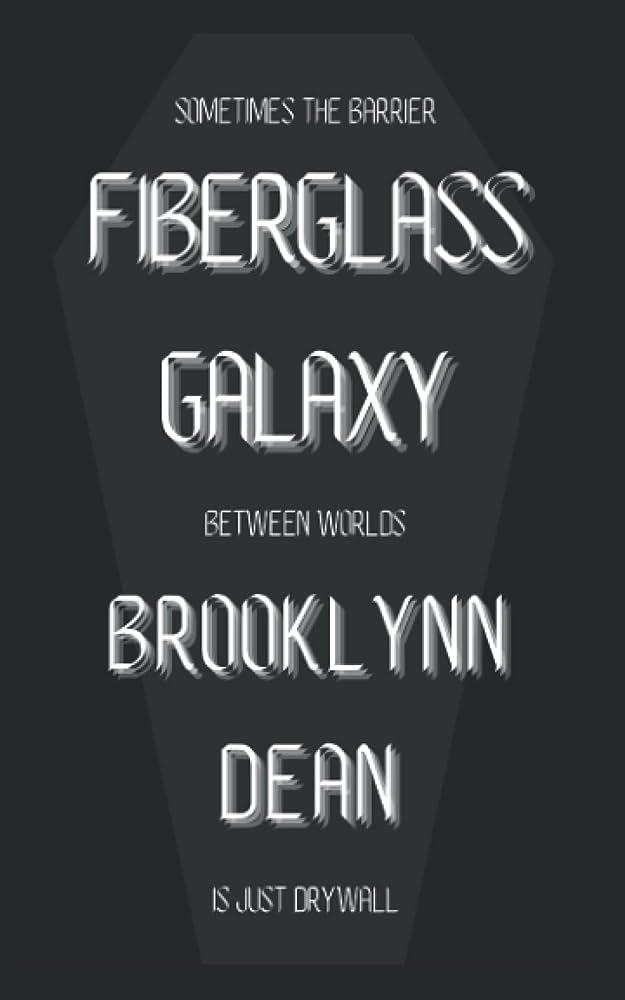You are here
Home › Books › Brooklynn Dean’s Novel 'Fiberglass Galaxy' Explores Universal Themes Of Love And Death ›Brooklynn Dean’s Novel 'Fiberglass Galaxy' Explores Universal Themes Of Love And Death
FTC Statement: Reviewers are frequently provided by the publisher/production company with a copy of the material being reviewed.The opinions published are solely those of the respective reviewers and may not reflect the opinions of CriticalBlast.com or its management.
As an Amazon Associate, we earn from qualifying purchases. (This is a legal requirement, as apparently some sites advertise for Amazon for free. Yes, that's sarcasm.)

‘They strive, and yet delay; They perish, Do we die; Or is this Death's Experiment, Reversed in Victory?'—Emily Dickinson
Since the dawn of humankind, the inescapable fact of our individual mortality has inspired more volumes of codified thought than any other. The question of what, if anything, lies beyond this mortal coil is the philosophic keystone of every religious doctrine, and from the prayers of saints to bored teenagers with oujia boards, our search for answers remains unabated. Accordingly, a 2021 survey conducted by the Pew Research Center found that nearly three-quarters of American adults believe in some form of afterlife. And while the largest body claiming a firm conviction in Heaven were from Christian denominations, fully half of religiously unaffiliated respondents (37% of the overall survey) assert the same belief.
That result suggests the notion of post-mortem survival instills some measure of comfort to death’s harsh finality. And why not? Death reigns as the ultimate Mystery, and for all our ever-advancing technological progress we remain as much in the dark to its truths now as in the days of Ancient Egypt. That unknowable nature can instill anxiety in some; an additional study revealed that up to 10% of the population experiences a significant degree of nervousness when pondering their own mortality. Thanatophobia, the extreme fear of death, can lead to persistent obsessive-compulsive thoughts of morbidity, and it’s this very affliction that Sabrina Morgan, the protagonist of author Brooklynn Dean’s engrossing, darkly comic novel Fiberglass Galaxy, suffers from.
When we initially meet her, Sabrina is thirty-three, a sometime amateur writer who has lived for a decade in a bland apartment with one unique feature: an intricate painting of a Milky Way-type star system graces the living room ceiling, a holdover from the previous owner that defies explanation and all attempts at repainting. Plagued since childhood with a crippling terror of the existential nothingness she worries her earthly demise will bring and prone to periodic bouts of self-harm (or ‘experiments’ as she calls them), Sabrina is constantly assailed by visions of decay—she imagines buildings crumbled to dust, people as rotten corpses, society obliterated by mass extinction. Trying to alleviate her condition, she begins a quest to uncover the secret of who painted the ceiling galaxy and why. To that end she drafts the expertise of her two closest friends: shy rich-boy museum curator Matthew and scruffy, by-his-bootstraps librarian Duke, who’s overt interest in extraterrestrials leads Sabrina to believe that the person responsible for the galaxy’s creation was in contact with celestial entities able to solve her inquiries concerning the hereafter. But is her newfound theory truly a step towards interacting with the otherworldly, or just a further manifestation of her fragmenting mental state?
Originally released in 2019, Fiberglass Galaxy represents a powerfully resonant exploration of history, life, love and, yes, death. While at first blush the plot may appear straightforward, Dean adeptly attaches flashbacks and layers of meaning that render even the smallest details important; her prose paints each page with a vibrant richness, and lush attention is lavished upon the movement of every character’s eyes, their lips, their mannerisms. Despite her gloomy outlook, Sabrina comes off as instantly likable, abounding with intelligence, wit and quirky sass (“Sorry for the sweat. I was just working out,” her slovenly landlord falsely boasts at one point, to which Sabrina dryly replies, “Yes, your fingers are looking slimmer.”), and many scenes buzz with boisterous wordplay. Beneath that, though, lurks a serious scrutiny of the more fragile aspects of the human psyche: Sabrina is no commonplace cookie-cutter goth girl, but a realistically drawn, three-dimensional figure, with her own faults, desires and singular way of looking at the world, a shade whose sometimes moody, standoffish impulses intentionally keep others at arm’s length. Some readers may find such a prickly lead inscrutable, even off-putting, yet for anyone who has known—or more, loved—a person like Sabrina in real life, the depiction rings achingly true.
Like all of Dean’s works, Fiberglass Galaxy is dense with ideas, deep with an innate understanding of emotion and unafraid to confront the audience. Here, as in her more horror-oriented Deification series, many of the questions regard belief—of the self and in religion. Indeed, one of the novel’s central figures is Akhenaten, the ‘Heretic Pharaoh’ of New Kingdom Egypt, best known as the father of King Tut and widely regarded as the world’s first monotheist. Once ascended to the throne, Akhenaten outlawed the worship of the traditional Egyptian pantheon in sole favor of the Aten, the deified representation of the solar disc. In real history, Akhenaten is seen as a divisive figure—a political revolutionary and idealist on the one hand, dangerous fanatic and renegade on the other. In the novel’s narrative, Sabrina begins to believe Akhenaten was something much more than either, a being in tune with unearthly forces, be they alien, angelic or otherwise.
In that base form, Fiberglass Galaxy can be considered whimsical sci-fi: a young woman determined to contact extraterrestrials, a Close Encounters for the Millennial generation. On a wider spectrum it exists as a love story, built upon the well-trod triangle trope: two men competing for the heart of the woman who loves them both. The cliché ends there, however, as the unfolding struggle becomes a study of opposing masculine archetypes: Matthew, the pure manifest intellectual, versus the incarnation of physical male perfection in Duke. Each man has their weakness, too—Matthew’s mental prowess and monetary assets may be superior, but he’s wracked by insecurity and a crippling lack of self-confidence; Duke, meanwhile, outwardly the ideal Adonis, has allowed his hard-scrabble upbringing to poison his view of the world and other people. Like an overlapping Venn diagram, however, both share a commonality in Sabrina, the woman each desire but neither can ever truly possess.
Yet even that romantic sheen extends backwards unto death; for what is love without the inevitability of loss? And death is indisputably the central theme of Fiberglass Galaxy; how we each learn to cope, or avoid coping, with the inevitable conclusion—of ourselves, of relationships, of empires and solar systems.
In the end Sabrina’s choices lead her, as it does all knowledge seekers, to a place of revelation. Whether that new territory is the one expected is for readers to discover, but if you’re in the mood for something funny, enlightening, romantic and heart-wrenching, Fiberglass Galaxy is well worth the invested time to explore.
I give Fiberglass Galaxy a 4.5 (out of 5) on my Fang Scale. As Sabrina often notes, Please, don’t forget.


